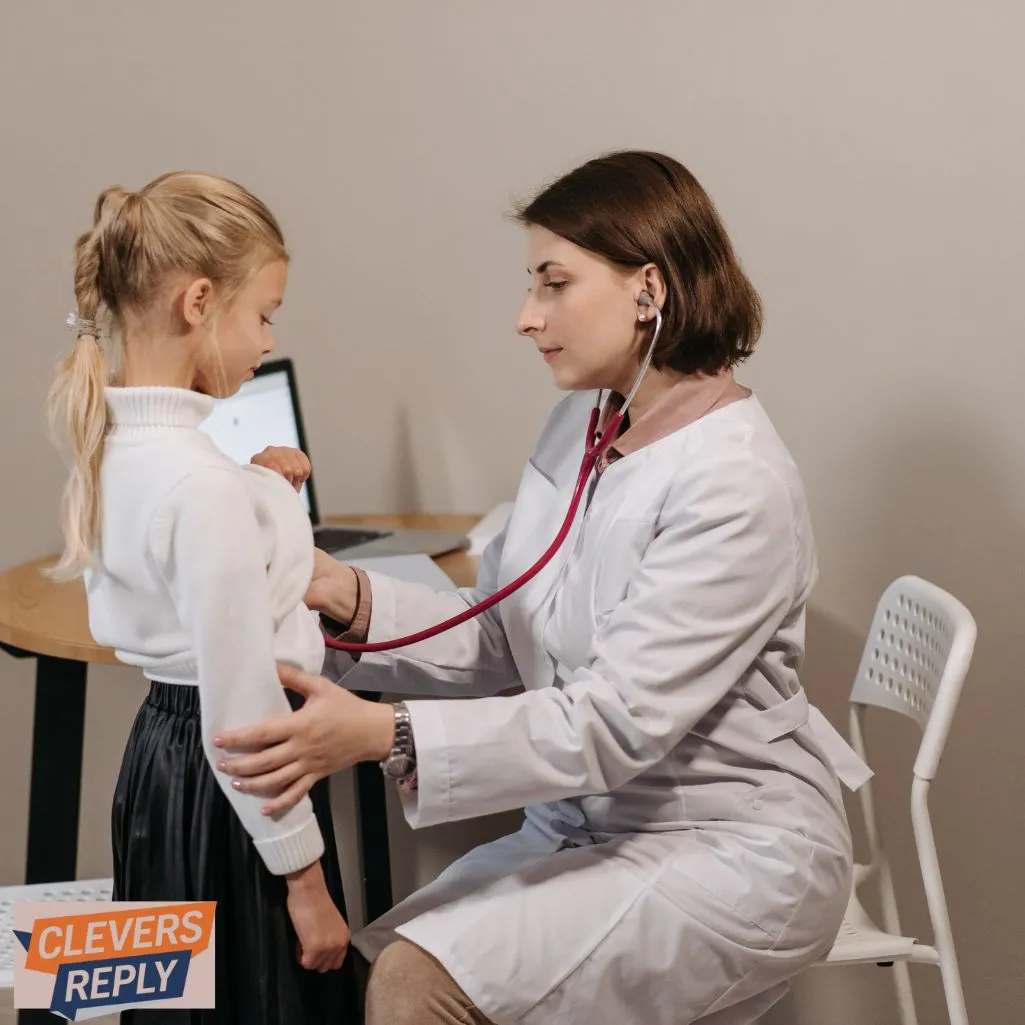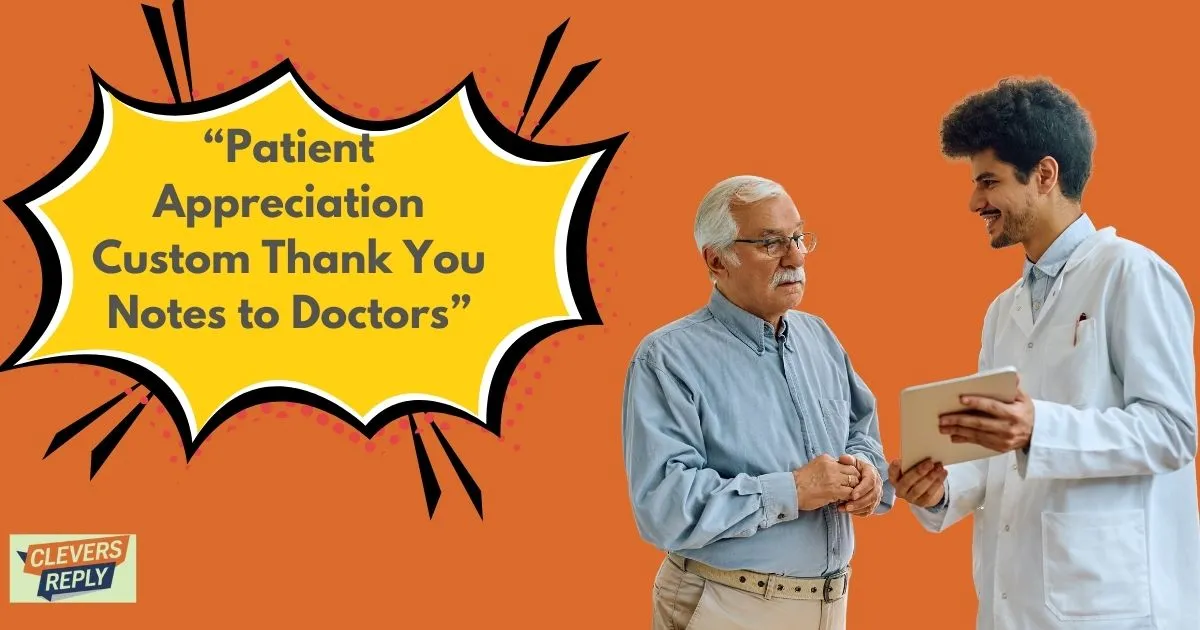“A simple thank you can make a huge difference, especially for those who dedicate their lives to caring for others.”
Writing a thank you note to a doctor is a wonderful way to express your gratitude for the care and attention you received. Doctors play an essential role in our lives, not only in treating our physical health but also in offering emotional support when needed.
If it’s a routine check-up or a life-changing procedure, their expertise, kindness, and dedication deserve recognition. A well-written thank you note can make a meaningful difference and show appreciation for the effort and time doctors dedicate to their patients’ well-being.
If you want to send a thank you note to your doctor, consider how much it can mean to them. A heartfelt message, whether simple or elaborate, can lift their spirits and reaffirm their commitment to their patients. Take a moment to reflect on the care and attention you received, and write down your thoughts. Sending a thank you note is an easy but impactful way to show your appreciation.
Writing a thank you note to your doctor doesn’t require fancy language. The sincerity of your words is what truly counts. From the greeting to the closing, each component of the note holds importance. A meaningful thank you note can be short and sweet or more detailed. No matter the length, it’s the message of appreciation that matters most. If you’re unsure where to start, this blog will guide you through the essential elements of crafting a thank you note that will make your doctor feel valued.
Thank You Note to Doctor from Patient
- Greeting: Begin with a polite salutation (e.g., “Dear Dr. [Name]”).
- Introduction: Introduce the purpose of your note.
- Express Gratitude: Thank the doctor for their care and attention.
- Acknowledge Professionalism: Mention the doctor’s expertise and professionalism.
- Appreciation for Time: Thank them for taking the time to listen to you.
- Personalized Thanks: Reference specific care you received that made a difference.
- Positive Impact: Describe how the doctor’s care positively impacted your life.
- Compassionate Care: Acknowledge their compassion and empathy towards you.
- Efforts Beyond Expectations: Mention how they went above and beyond in your treatment.
- Support During Recovery: Thank them for their support during your recovery process.
- Emotional Support: If applicable, thank them for offering emotional support.

- Clear Communication: Appreciate their clear and thorough communication.
- Follow-Up Care: Acknowledge their efforts to follow up on your health.
- Comfort and Ease: Thank them for making you feel comfortable during appointments.
- Praise for Office Staff: If relevant, mention the helpfulness of their staff.
- Timeliness: Appreciate their punctuality in appointments or follow-ups.
- Trust in Their Care: Express your trust in their medical judgment.
- Innovative Treatments: If they used unique methods, express gratitude.
- Detail-Oriented Care: Thank them for paying attention to details in your treatment.
- Acknowledging Expertise: Recognize their qualifications and experience.
- Encouraging Words: Appreciate their encouragement during difficult moments.
- Specialized Knowledge: If the doctor specializes in a certain area, mention this.
- Reassurance: Thank them for reassuring you during your treatment process.
- Support for Family: If the doctor cared for your family, mention that as well.
- Warmth in Care: Appreciate the warmth and kindness shown in your care.
- Patient-Centered Approach: Thank them for focusing on your individual needs.
- Response to Questions: Thank them for answering your questions thoroughly.
- Positive Office Environment: Mention the comfortable atmosphere in their office.
- Availability: Thank them for being available for your concerns.
- Efficient Treatment: Appreciate the efficiency of the treatments or procedures.
- Holistic Care: Mention their holistic approach to your health.
- Personal Touch: Acknowledge their personal approach in your care.
- Confidence in Recovery: Thank them for instilling confidence in your recovery.
- Gratitude for Understanding: Thank them for understanding your specific health needs.
- Referral to Others: If applicable, thank them for referring you to another specialist.
- Attention to Detail: Mention any specific detail they attended to that mattered to you.
- Gratitude for Pain Management: Thank them for managing pain effectively.
- Post-Treatment Care: Appreciate any advice or instructions for post-treatment.
- Praise for Procedures: If a procedure was involved, express gratitude for how it went.
- Time with Family: If the doctor allowed time for family consultations, acknowledge this.
- Commitment to Better Health: Thank them for their commitment to your well-being.
- Recognizing Their Dedication: Appreciate their dedication to their field of work.
- Building a Relationship: Thank them for developing a strong patient-doctor relationship.
- Understanding Concerns: Mention their understanding of any worries or fears you had.
- Compassionate Bedside Manner: Thank them for their gentle and caring approach.
- Post-Surgery Care: If you had surgery, thank them for their care afterward.
- Expression of Satisfaction: End by expressing your satisfaction with the care received.
- Best Wishes: Offer your best wishes for their continued success.
- Closing Salutation: Use a respectful closing phrase (e.g., “Sincerely,” “Gratefully”).
- Signature: Sign your name to make the note personal.
Heart-Touching Thank You Messages for Friends
Understanding ‘Thank You’ Notes
- Definition: A thank you note is a message expressing gratitude for a gift, favor, or act of kindness.
- Importance: Thank you notes help nurture positive relationships and show appreciation.
- Occasions for Thank You Notes: Thank you notes are appropriate for birthdays, weddings, professional achievements, and more.
- Tone of the Note: The tone should match the formality of the occasion, from formal to casual.
- Format: A traditional thank you note includes a greeting, body, and closing.
- Handwritten vs. Electronic: Handwritten notes are more personal, while electronic notes can be quicker and more convenient.
- Why Personalization Matters: Personalizing your note adds sincerity and depth to your message.
- Length of the Note: A thank you note doesn’t need to be long but should be thoughtful.
- Timing of the Note: Send thank you notes promptly to show genuine appreciation.
- Proper Addressing: Always address the recipient correctly, using the proper title or name.
- Expressing Specific Gratitude: Be specific about what you are thanking the person for.
- Gratitude Over Material Gifts: Thank you notes don’t always have to be for gifts; they can also be for favors or support.
- Impact on Relationships: Writing a thoughtful thank you note can strengthen relationships.
- Balance in Tone: A good thank you note maintains a balance between warm and professional tone.
- Mentioning Emotions: It’s important to convey your emotional response to the kindness you received.
- Positive Reinforcement: Acknowledge the recipient’s efforts and how it made you feel.
- Cultural Significance: Thank you notes hold cultural significance in many societies as a gesture of respect and gratitude.
- Gratitude in Business: In business, thank you notes can enhance professional relationships and reputation.
- How It Benefits the Sender: Writing a thank you note can boost the sender’s reputation and self-esteem.
- How It Benefits the Recipient: For the recipient, receiving a thank you note can lift their mood and make them feel valued.
- Common Mistakes to Avoid: Avoid being too generic or vague in a thank you note.
- Examples of Common Thank You Notes: Include examples such as thank you for a gift, thank you for support, and thank you for a favor.
- Format Variations: Thank you notes can vary based on the relationship (formal vs. informal).
- Gratitude for Service: A thank you note can be written to express appreciation for professional services received.
- Tone for Formal Notes: Formal thank you notes are structured with a more professional tone.
- Tone for Informal Notes: Informal notes can be lighter and more personal.
- Brevity is Key: Keep the thank you note concise but impactful.
- Expressing Emotional Gratitude: Use the note to convey how the act made you feel.
- Gratitude for Team Efforts: If multiple people helped, send notes to each person.
- Personalizing the Message: Refer to specific details that show you truly appreciate the recipient’s effort.
- Gratitude for Ongoing Support: If you are receiving continuous support, express ongoing thanks.
- Professional Thank You Notes: These should be polite and appreciative, while remaining neutral and concise.
- The Art of Saying Thank You: Saying thank you helps to create a positive atmosphere and mutual respect.
- Gratitude for Time: Acknowledge the time the person invested in helping or supporting you.
- Closing with Sincerity: Always end your note on a sincere note with a warm closing.
- Use of Appreciative Words: Use words like “grateful,” “thankful,” and “appreciative” to express your feelings.
- Handwritten vs. Typed: Decide whether to write by hand or type based on the formality and personal preference.
- Consideration of the Recipient’s Preferences: Consider the recipient’s preferences when deciding the format or tone of the note.
- Acknowledging Future Interactions: If the person’s kindness affects future interactions, express that as well.
- Sympathy Thank You Notes: These notes express thanks for condolences and support during tough times.
- The Effect of Gratitude: Gratitude fosters positivity and strengthens bonds between people.
- Handling Professional Thank You Notes: Keep these notes respectful, sincere, and professional.
- How Gratitude Builds Trust: A well-expressed thank you note can contribute to building trust and goodwill.
- Using Humor in Informal Notes: In informal notes, adding a touch of humor can make your gratitude more heartfelt.
- Following Up with Thank You Notes: Follow up with a thank you note after important events or milestones.
- How Thank You Notes Help in Networking: Sending a thank you note after networking events helps solidify connections.
- Impact on Team Morale: Sending thank you notes to colleagues or team members can improve team morale.
- Showing Professional Etiquette: Sending a thank you note reflects professionalism and respect in your field.
- Benefits of Gratitude for Your Mental Health: Showing gratitude through thank you notes can improve emotional well-being.
- Final Thoughts: A well-crafted thank you note is a small gesture that leaves a lasting impact.
Components of a Thank You Note
- Start with a respectful greeting like “Dear [Name].”
- Use the recipient’s title (e.g., Dr., Mr., Mrs.) for formality.
- Consider the relationship for the tone (formal vs. casual).
- Use a warm and friendly opening if the relationship is informal.
- Include a short opening phrase like “I hope you are doing well.”
- Start the note by clearly expressing your gratitude.
- Use words like “Thank you,” “I appreciate,” or “I’m grateful.”
- Mention specifically what you are thanking the person for.
- Be sincere in your expression to show genuine appreciation.
- Avoid being vague and focus on the particular reason for thanks.
- Mention what the person did that you are thankful for.
- Highlight the details of their act of kindness.
- Personalize the message by recalling specific actions.
- Make sure to be clear about how their action impacted you.
- If the note is for a gift, mention the gift and how it is meaningful to you.
- Include personal details that make the note feel heartfelt.
- If appropriate, add an anecdote or specific memory related to the gesture.
- Show how their actions made you feel (e.g., happy, grateful, relieved).
- Reflect on any positive outcomes or changes due to their kindness.
- Make the note personal to reinforce your connection.
- Compliment the recipient for their skills or generosity.
- If thanking a doctor, mention their expertise and professionalism.
- Acknowledge how their actions reflect their character.
- If the gesture involved service, express appreciation for their dedication.
- Praise the recipient’s thoughtful nature or consideration.
- Recognize the effort the person made for you.
- Appreciate the time, energy, or thought they invested in the gesture.
- Thank them for going out of their way to help or support you.
- Highlight how much you value the effort they put into the action.
- Acknowledge if they did something unexpected or extra for you.
- Set a tone that aligns with the relationship (formal for professional, casual for friends).
- Make the tone warm, friendly, and sincere.
- Avoid sounding too casual if it’s a formal or professional thank you.
- Maintain a polite and respectful tone throughout.
- Be mindful of the length and don’t make the note sound too long-winded.
- Close the note with another expression of gratitude.
- Use a closing sentence like, “Once again, thank you so much.”
- If relevant, express that you hope to return the favor someday.
- End with a thoughtful statement like, “Your kindness means a lot to me.”
- Reaffirm the positive impact of their gesture.
- Sign your name at the end to make the note personal.
- Use your first name for informal thank you notes, or full name for formal notes.
- If you’re sending a professional thank you, consider including your title.
- Ensure your signature is legible and adds a personal touch.
- If it’s a professional thank you, you can also add your contact details.
- A handwritten note adds a personal, meaningful touch.
- For a formal occasion, a typed note may be more suitable.
- Handwritten notes are more appreciated for personal and heartfelt messages.
- Typed notes may be appropriate in business or professional settings.
- Choose the format based on the context and your relationship with the recipient.
Tips
To make your thank you note even more engaging, consider these tips:
- Be Specific: Mention specific actions or moments that made a difference to you.
- Stay Positive: Keep the tone upbeat and focused on the positive aspects of your care.
- Be Genuine: Let your sincerity shine through. Authenticity goes a long way.
- Handwritten is Special: If possible, write your note by hand. It adds a personal touch that shows effort.
- Short and Sweet: Keep your note concise. Doctors are busy, so a brief but heartfelt message works best.
Key insghits
1. What should I include in a thank you note to my doctor?
Start with a greeting, express your gratitude, mention how they positively impacted your life, and acknowledge the effort they put into your care.
2. How long should a thank you note to a doctor be?
Your note doesn’t need to be long—just a few sentences expressing your gratitude and appreciation are enough.
3. Should I send a handwritten or electronic thank you note?
A handwritten note feels more personal and thoughtful. However, an electronic note is also acceptable if it is timely and heartfelt.
4. Can I mention my family in the thank you note?
Yes! If your doctor provided care to your family, it’s nice to acknowledge that as well.
5. When is the best time to send a thank you note to my doctor?
Send your thank you note shortly after your treatment or appointment while the experience is still fresh in your mind.
Final Thoughts
Sending a thank you note to your doctor is a simple yet powerful gesture that can make a meaningful impact. It shows appreciation for their hard work, expertise, and the care they provide to their patients. Whether it’s for a routine visit or life-changing treatment, doctors are always grateful for a sincere thank you. By taking the time to craft a thoughtful message, you can brighten their day and make them feel valued. So, don’t wait—express your gratitude with a heartfelt note today.

Hi! I’m Isabel, and I love crafting thoughtful responses that bring warmth and positivity. Whether it’s a simple thank you or a heartfelt wish, my goal is to make every message meaningful.

